
Biology 202
Neurobiology and Behavior
Spring 2001


| Biology 202 | 
|
Why take Biology 202?
| Major/concentration requirement? | 28 |
| Satisfy science requirement? | 7 |
| Interested in biology/nervous system? | 22 |
| Interested in psychology/behavior? | 8 |
| Interested in philosophy/nature of reality/human experience? | 5 |
Disturbed by/want to understand headlines about research on nervous system/behavior?
| 2 -> 10 |
| Want to understand who you are? why you/other people behave the way you/they do? What you/they can do about it? | 19 |
| Other? | none |
Neurobiology and BEHAVIOR ... what is "behavior"?
| breathing walking pulling hand way from flame eating drinking | responses to to environment and individuals requires physical manifestation? has to be observable? purposeful action as distinct from reflexes? | include "non-observable" on grounds that
| dreaming thinking sleeping emotion | preying and praying talking, listening experiencing being, self being death |
NEUROBIOLOGY and behavior ... Neurobiology = study of the nervous system ... what is the "nervous system"?

| Image by Andreas Vesalius (1514-1564), contemporary of Copernicus, suggested (less than 500 years ago) that nervous system rather than heart was origin of behavior (see Milestones in Neuroscience Research for a time line extending from 4,000 B.C.). | 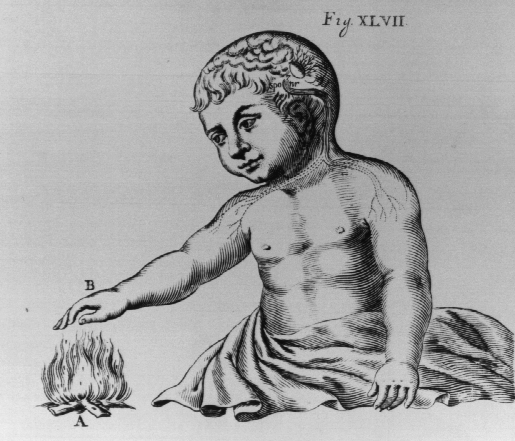
| Image by Rene Descartes (1596-1650). Set framework for several centuries (and continuing) discussion: mind and body distinct things or same thing? |
Nervous system is material object, part of body, can be touched, manipulated, measured. What IS relationship between mind/body? between mind/brain? between brain (nervous system) and behavior? | |||
| Agree with Dickinson et al. | 22 |
| Disagree with Dickinson et al. | 7 |
| Unsure/fence-sitting | 14 |
Brain = behavior: issue is not "Truth" but whether it is a good "summary of observations", "working hypothesis" ... what is the trend of the evidence? That's what the course is about:
Starting with what one thinks .... and getting used to/seeing the advantages of being wrong
How DOES the nervous system work?
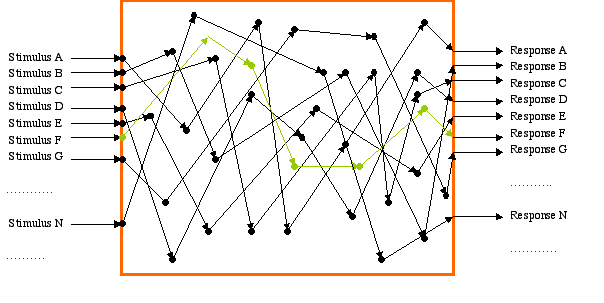
| Virtues
|
Another model improving iteration - boxes in boxes
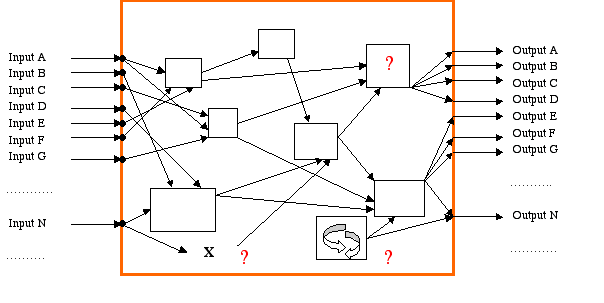
| Virtues
|
| FROM THE FORUM: BRAIN=BEHAVIOR? |
| Some problems |
| Maybe my problem is that I don't think there can be enough variation within the brain and how it functions to accout for all of the uniqueness that exists amongst people. I mean, how many different things can the brain do that differently? .... Jenny Cohen
what of intuition? Or just "having a feeling" about something? ... Nana Dawson-Andoh Changing one's cognition and actions can have an observable physiological effect on the brain. How does the brain = behavior theory account for this? ... Huma Rana I get stumped, however, when I think about the question of life after death. Yes, the brain decomposes, but it's nice to think that the mind lives on in some capacity. ... Gwen Slaughter It seems that the two primary objections are (1) the existence of human spirituality and soul, and (2) consciousness. ... Daniel Burdick Environment certainly affects one's behavior, but does it affect one's brain function? ... Meghan Shayhorn When a person becomes addicted to nicotine, he feels a craving for this substance. This sense of craving presumably comes from the brain. However, a person can overcome the urge to smoke through, as I see it, the power of a separate entity: the mind. Although the body (more specifically the brain, which directs the signal for the craving) asks for nicotine, one's mind has the power to deliver or not deliver the nicotine to the body through the choice of whether or not to smoke. ... Christine Farrenkopf Personally, reading laying on a bed creates sleepiness. This suggests that body position could influence our thinking, which then can alter our behavior. What if one had a leg or arm amputated? A bodily change such as this may cause a change in mental state leading the person to behave or act differently ... Euree Choi How can one explain in a scientific manner, for example, as the French philosopher Malenbranche had pointed out, how free will dictates human behavior? We call psychokinetics (the ability to move objects without physical contact) magical and supernatural, but in actuality, lifting my hand up in the air seems to me like pyschokinetics already! What part of science can explain to me how my DESIRE to lift my hand translate into nerves and muscles joining in the action? What exact physical entities make up thought and free will? Surely not the brain? Or do we have free will at all? ... Irma Iskander Our brain communicates with us, but the mind is something that the brain does not have the capacity to understand, and therefore the mind is a part of a higher power. ... Katerina Sioutis |
| Some directions |
| Could it be possible that the mind exists within the brain, much like the true wizard in the Wizard of Oz? .... Sural Shah
I had never considered the fact that the two might be the same and yet also separate; I had never considered Emily Dickinsons proposal that one is contained within the other. Here is an idea that allows for my separating mind and brain while suggesting that their distinction may be as components of one larger whole. (What that whole is, I dont know.) ... Caroline Ridgway |
| And on ... |
| I automatically put myself into the fence sitting category because I don't have all the information on brain and behavior. I realized this will never be true. I will never find an answer just keep exploring ideas so I might as well pick a position to explore them through ... Sabah Quraishi
neuroscience is a fence sitters discipline. It seeks to reframe the questions of biology and psychology in terms of one another. It is safe and I believe it offers a useful perspective. ... Avis Brennan |
The "real" nervous system - an input/output box consisting of interconnected input/output boxes?

| 
|
| photo from Kemali and Braitenberg, Atlas of the Frog Brain, Springer-Verlag, 1969 |
Each box in turn (somewhat arbitrarily) subdividable into smaller boxes (with some differences among vertebrates, to return to)
And those ... yes, "its boxes all the way down"
Neuron as common, smallest box and as input/output element, connected to other boxes
Can use to show that larger boxes interconnected, and to rigorously specify "input" and "outputs" of largest box ... nervous system itself
So ... at least parts of our box within box model real ...
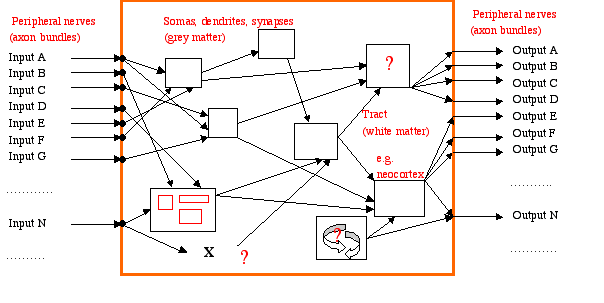
| Additions:
|
1 February
|
Implies all brains different, brains change over time - true? Implies ARRANGEMENT of neurons critical (sight overstatement to make point) Overwhelmingly overwhelming majority of neurons are interneurons (get input from, talk to other neurons), sensory/motor neurons rare - implications? Searching For the God Within, from Newsweek, thanks to Isabella Obaze |
Are nervous systems different if behavior different? - a first look
Back to vertebrate brains in general
Outputs - topographic organization
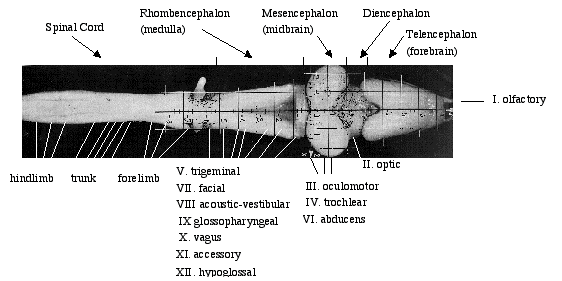
| For additional information: |
Usefulness of the interconnected box model
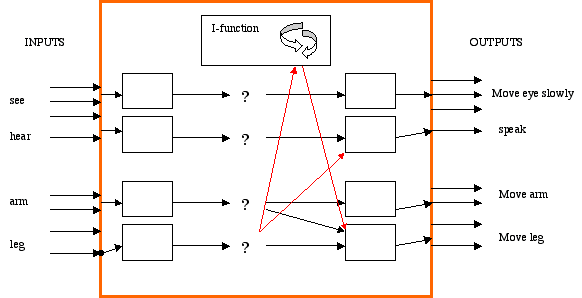
| Ascending somatosensory pathways |
6 February
|
" I found it really interesting that he would still move his foot if pinched, even if he could not feel someone pinching it. It never crossed my mind that you would not have to feel something to react to it." ... Sarah McCawley
"This shows that the body does not necessary need an I-box in the to try to keep out of danger; it will do it reflexively. The “I” in fact, tends to override the reflexes, evident when you carry a hot casserole dish from the oven to the table without pulling your hands back and dropping it. So Christopher Reeve is in the brain and not diffused throughout they body. If he was, then severing the spinal cord would have some effect on his behavior but he would still be in control of most of his bodily functions." ... Dena Gu "I do not view the sense of self as a box within some bigger thing. What is bigger than the experience? And what is the significance of something not experienced? ... Can't the consciousness still involve a labyrinth of associations, some of which possibly even transcend our immediate experience of awareness?" .... Kristine Hoeldtke "So I was thinking about reflexes and the brain and the I-function...it makes sense to me that a reflex behavior like moving away when the leg is pinched is unaffected in Christopher Reeve because the signal goes right to the motor neurons, not to the brain. But what about when you approach the line between what is a reflex and what is a brain-moderated action? For example, if someone pokes your brow bone, you blink (try it, it's kind of fun), but if you concentrating on it, you can keep from blinking. Your brain must be involved in that." ... Caitlin Costello "I honestly believe that who I am is not part of anything. Sure life experience, my genetic makeup, and brain all compose me, but I feel that there is MORE to me then these physical things." .... Melissa Hoegler " I have a hard time comparing the size of the self to the size of the nervous system. If forced to, I would lean toward saying that the self, as an immaterial concept, is larger than the nervous system, which is material and measurable." .... Rachel Kahn |
Observations "surprising", but have to be accepted - Issue is "how to make sense of them"
Two kinds of behavior ("reflex" versus something-else) intuition probably not useful
|
"It seems a little counterintuitive, to say he can move his leg (not that he is moving it) when he is paralyzed." .... Claire Walker
" One major question that the postings have given me is what would a mind or soul be if one existed?" ... Sarah LeDoux "Those who experience phantom limbs are quite certain that the part of their body which has been removed continues to exist as part of their self." ... Alexis Webb "Whether this sense of self can be extended to an actual self -- with all of its theological and metaphysical implications -- is of course trickier. In part, it depends on who gets to define the self. ... Other similar examples can be seen in behaviors under the influence of drugs, alcohol, or even psychoactive medications. It's common for someone under these influences to say that such behaviors "aren't me -- it's the drugs" (or in reverse in the case of mental illness, "it's not me -- it's the illness"), even though observers would most likely say that it was this person. Again, who's right?" ... Daniel Burdick " I wonder if the I-function is unique to humans/mammals/vertebrates. I understand, though, that this is probably a currently untestable hypothesis." .... Sadie White "if, as was suggested, a brain were taken out of the body, and allowed to remain "alive" would there still be normal responses going out of it and even more so, since by virtue of the "I-function" the self is contained with in the brain, does that mean that this freely existing brain would be a person, an individual?" ... Jessica Miller People with glove anesthesia or paralysis do not experience atrophy of their muscles as paraplegics do. Instead, they exercise their muscles without being aware of what they are doing. Also, people with conversion blindness do not get into as many accidents as people who are organically blind, which suggests that they have some vision even if they are not aware of it. Are these symptoms a result of a disturbance in the I-function? ... Huma Rana " I bet all animals havesome kind of perception-- they experience pain, right? But do they have consciousness of their experiences? What about babies? Do they have an "I" function if they experience pain and pleasure but have no self-awareness of it? And what about autistics? One mark of autism may be that they lack "theory of mind" -- ie, the awareness that other people have mental states. Does the "you" function somehow relate to the "I" function? I mean, if there are people who are unaware of their consciousness or that of others, do they have an "I" function?" .... Andrea Miller "What is interesting me now, are people with psychological disorders such as split or multiple personality disorder. Have their "I" boxes been divided into parts? Is something "clogging" up the input and output channels? If the "I" function is what makes us behave as individuals, then what's going on in people who behave like more than one?" .... Jenny Cohen "Factoring in the idea that this self is governed by or stems from certain areas of the brain, does this mean that the I-function is in a constant state of change?" ... Megan Mendillo " The "I-function" is an interesting concept. Free will can very easily flow from this idea." ... Matt Fisher |
Action potential
Resting potential
Receptor/generator potential
Synaptic potential
8 February
Action potential - longitudinal battery which appears/disappears successively at successive points along an axon ("travels" at finite speed), "all or nothing" transient (millisecond range) event
To understand action potential, need first to understand resting potential - transverse battery, continuously present, with potential for continuous variation
13 February
|
I have to admit that learning about the electrical properties of a neuron is a bit dry. ... So I say, try and get through the dry stuff so we can apply the concepts to the more interesting stuff. ... Elizabeth Gilbert
I've always been told that the KISS theory is the best way to explain something: Keep It Simple, Stupid. What could be more simple than the flowing of ions across a membrane to generate an electrical potential? ... Unfortunately, it's those areas outside of that KISS theory which are the most interesting to me. Ideally, I would be able to apply what I have learned about the actual physical world to things like the "I-function" or "consciousness." Our discussion of neurons gives me some hope that this kind of connection is possible. Maybe, if you "keep it simple" to start with, the places you can go reach into those fuzzy and not so simple realms. ... Alexis Webb Before I began to study these things, I had never really thought of behavior as in any way related to electricity or "batteries." In my fairly oblivious conception, fundamental life energy was supposed to be more abstract somehow. As I begin to make this connection, however, the mystery of behavior becomes a little bit more tangible - and what's more exciting than that? ... Kristine Hoeldtke ..... I am coming more and more to the conviction that the rudiments of every behavioral mechanism will be found far down in the evolutionary scale and also represented even in primitive activities of the nervous system ... Karl Lashley, The Problem of Serial Order in Behavior, IN: Cerebral Mechanisms in Behavior, L.A. Jeffries ed., Wiley, New York, pp 112-136, 1951 The sooner we recognize the fact that the complex higher functional Gestalsts which leave the reflex physiologist dumfounded in fact send roots down to the simplest basal functions of the CNS, the sooner we will see that the previously terminologically insurmountable barrier between the lower levels of neurophysiology and higher behavioral theory simply dissolves away ... von Holst and Mittlestaedt, Das Reafferenzprinzip, Naturwiss. 37: 464-476, 1950 (english translation in Holst, E. von, The Behavioral Physiology of Animals and Man, University of Miami Press, 1973 pp 139-173). ..... But in behavior that is exhibited without outside input or stimulus, does the neuron emit its own signal to be passed on to other neurons and eventually evolving into visible behavior. And if not, where does the spontaneous action come from and why? ... Dena Gu I am still perplexed by the question of free-will and this study of neurons seems to complicate that question. As we have talked about so far with regard to action potential and resting potential, there must always be a stimulus, something that starts the battery moving. Where does this stimulus come from if a behavior is simply spontaneous? Is everything we do a reaction to something whether we can observe it or not? ... Alice Goff
|
Have resting potential (transverse battery) and core of explanation of action potential: adjacent membrane regions with different transverse batteries (because of different selective permeabilities) - Issue is how to get it to MOVE, with finite velocity?
Threshhold - non-linearities
And the big question ... can signals start in the middle of the box?
Can/will go on to receptor and synaptic potentials ... will need no more than one additional idea
And then ...
15 February
Have action potential, resting potential, spontaneous activity, based on ...
Have done neurons, their properties For more/different (quick sample):
Basic idea: neurons substantially similar, integrate currents due to permeability changes, send signals (action potentials, currents, chemicals) on to other neurons ... Is that ENOUGH?
Don't know EVERYTHING about neurons, but doubt that basic story will change. So needs to be either "in addition to" neurons or "organization of" neurons ....
If brain=behavior then it has to be "organization of"; ie, what we can't make sense of in properties of neurons themselves we had to be able to make sense of in terms of assemblies of them (neurons don't "have a mind of their own", what do we mean by "mind"? how account for it?)
| How does the neuron know which neurotransmitter to release when the electrical impulse reaches the end of the axon? We know the impulse is the same in all cells, it's just the movement of ions through the membrane of the neuron. Why does the same electrical impulse result in different responses? .... Dena Gu (et al) |
Towards "organization":
| The real problem, though, is seeing exactly how these two levels are connected; we haven't yet developed an understanding of how the "simple" and relatively easily comprehensible functioning of a neuron translates into the more complex behavior. ... Daniel Burdick (et al) |
Have general ideas of units, rules of construction ... let's start building, see what we can get to connect the two levels?
Begin (non-traditionally) with output - "action"
Action = "motor symphony"
Accounting for motor symphony
| 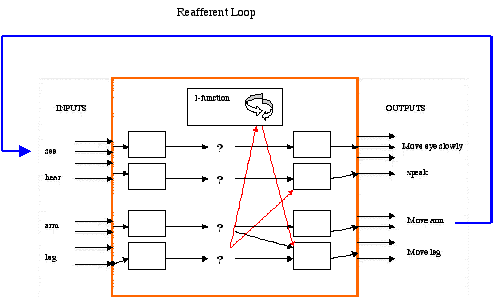
|
Looking more closely at the "central pattern generation" hypothesis
22 February
Reafferent loop - exteroreceptors and proprioceptors
Earthworm movement
27 February
Action = motor symphony = pattern of activity across motoneurons
Nervous system has stored motor scores - "central pattern generation"
Central pattern generators localizable - boxes within box
What are they in terms of neurons? How do they get there? But first ...
Continue effort to localize ... discover?
Motor sympony lacks a conductor - coordinated performance of independent players - efference copy = corollary discharge
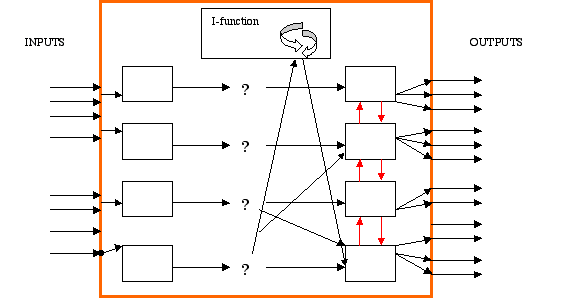
1 March
Have CPG as box made up of interconnected neurons, organization from genome/experience/combination
Also have corollary discharge = efference copy
Look at some more uses/implications of that:
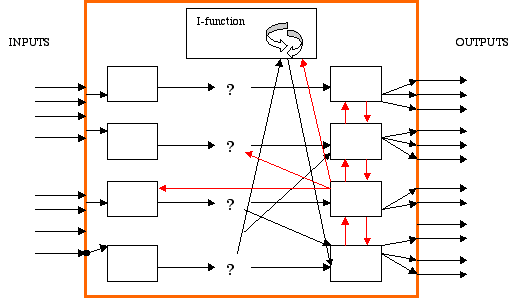
6 March
Let's now reinstate reafferent loop, see what new things that gets us
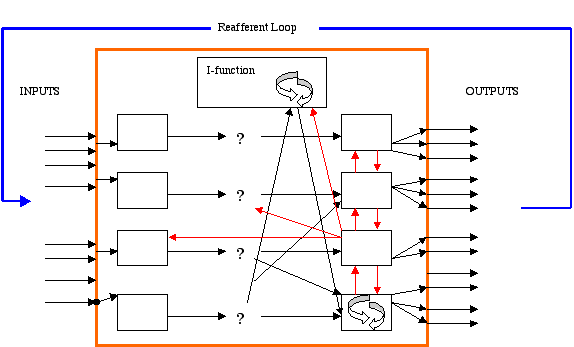
Stretch "reflex"
Not an input-output pathway but a feedback loop
8 March
Many more boxes/tracts relevant to output side of nervous system
Cerebellum, basal ganglia, etc.
Focus on motor cortex
Have good spring break ...
22 March
Recapitulation:
 |  |
Lessons learned "from the output side":
Recall "labelled line" - see lightening, hear thunder because different neurons activated, send action potentials to different places
Vision as a paradigmatic case (is it? ... is at least best studied, and shows some general principals)
"Imaging" - essential role of non-neural structures, optics of eye
24 March
Imaging - either pin-hole or refraction
27 March
|
I know my eyes are always moving from place to place and focusing on different things. I was wondering if that cuts down on how much the brain actually makes up to replace what is missed by the blind spot ... Dena
Could our minds actually be working around the I-function, like workers around a cranky boss, predicting and working around its reaction before something uncomfortable occurs? ... Jessica
To me, more than anything, this blindspot illustrates our ever-present tendency to be wrong, misguided, or one-sided when it comes to perception in general, and our subsequent need as scientists, or just as human beings, to questions our own beliefs ... Kristine Does this imply that the brain creates reality? This gives a lot of credence to philosophy and its suggestions that nothing is real ... Matt A neuroscientist is completely colorblind. She has never physically seen the color red, but she does know how the brain works, how the color receptors in our eyes work, so she knows HOW to see red. The question posed is: is the neuroscientist able to perceive red simply by understanding the method by which it happens? Is she conscious of a color that she's never seen? ... Alexis ... see Vision in a Complete Achromat, who is a vision scientist. Certainly, a lot of people believe pretty strongly in things they can't "be aware of," and a lot of behavior in many people is determined by intuition. This sort of goes to the question raised on Tuesday about the purpose of the I-function: if many behaviors are better performed without the involvement of the I-function, why do we need it at all? ... Dan Gestalt psychologists have explained this phenomena with principle of continuity (that things are seen as continuous wholes whenever possible) but I do not understand on a brain level WHY this is true, or HOW the brain fills in details that are not directly given in the stim around it ... Andrea I would like to mention something interesting that I read on the web. The philosopher Daniel Dennet has proposed that the brain often does not fill in our experiences (ie. blind spots). He says that if we don't notice the blind spot, it is because the brain is not actually doing anything with the information from that part of the retina. The region is just being ignored and the brain does not go back to fill in our experience - because we have already jumped to a conclusion of what we saw or experienced. But why would the brain choose to ignore information coming into the retina? Why does the brain "fill in" our experiences in the first place? ... Katherine |
A neuroscientist is completely colorblind. She has never physically seen the color red, but she does know how the brain works, how the color receptors in our eyes work, so she knows HOW to see red. The question posed is: is the neuroscientist able to perceive red simply by understanding the method by which it happens? Is she conscious of a color that she's never seen? ... Alexis ...... see Vision in a Complete Achromat, written by a vision scientist.
The issue of color, or
This is not yellow |
or
Is color an aspect of physical "reality" or "made up" by the nervous system?
Physical "reality"
Have brightness, color, need third dimension?
| Binocular stereopsis resolving conflict | But ... creating ambiguity |
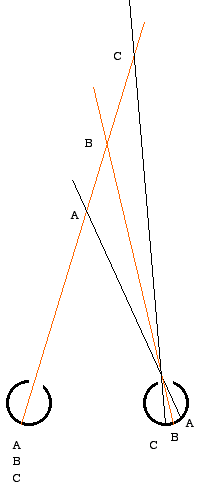 | 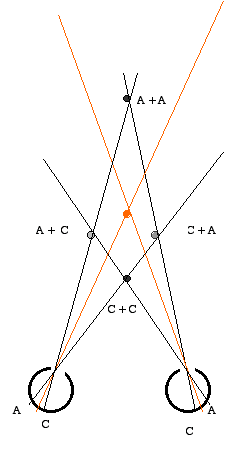 |
Next problem - how does nervous system create? fill in, add color, add depth?
Where IS "picture in head"?
Multiple ganglion cell types
Retinal projections ... another ... another
Blindsight and its implications
The story of the frog ... getting it less wrong without neocortex
|
I would enjoy spending the last three weeks on a wrap-up of the I-function and how it relates to emotions and creativity ... It seems that creativity is still very much a mystery to psychologists and neuroscientists alike ... Diana
My mother once told me, that being a good cook was similar to intelligence. Anyone can cook. Likewise anyone could be smart. A good cook, however, contemplated the leftovers in the refrigerator, trying to figure out what might go with them. This is what intelligence was-being able to reason and figure out what to do with the questions in life. Thus, with my mothers words of advice the thought of artificial intelligence seemed bizarre and far removed from the cook analogy ... Nazia The only other thing I'd like to talk about briefly is the topic of AI. We've talked about it in class, I have read the paper on it and feel relatively secure that I understand how it works. But this is a topic that's bothered me for a long time and I think it would be interesting to talk as a class about whether or not it's a good idea. In my experience, science majors think it's great and humanities majors think it is the one great act of huberous that's going to lead to the extinction or enslavement of our species (this is a generalization of course). Being a humanities major with a science minor, it would be very interesting to me to find out what's going on in the brains of people who feel strongly one way or the other about it. We could also tie in (to make it a little more neurobiologically oriented)a discussion of ethics, what they translate to in the brain, and why some are common for almost everybody and some are different for each individual ... Jenny Anyway I think for the last few weeks of class we should discuss the sleep pattern and how dreams are formed. If we could also touch upon how personality is related to the nervous system ... The idea of stress is also very interesting, as I am taking the MCAT on Saturday as well, but am experiencing considerably less stress than some of my friends ... Claire This entire semester, before I come over to Neurobio and Behavior at Bryn Mawr, I have a molecular neurobiology class at Haverford. In that class we learn about the pathways of g-protein, the insulin receptor, light/dark adaption. Basically, it's all memorization. I've had trouble balancing these totally different areas of the same field. They are both neurobiology, but I think I've secretly been thinking thet Haverford's class is the brain and this one is the mind. What if we weren't able to think about these things in any sort of real capacity? What if all thinking was was just chemicals and pathways and the next step, no room for individuality. How does creative and curious thinking somehow arise out of these boring and universal pathways? I guess since thinking is creative then it has to be the mind, but the mind is the brain... I guess what I'm trying to say is, I'd like to spend the last 3 weeks trying to get less wrong about this distinction. I'm really interested in the question of where creativity and curiosity arise in all the biology ... Kate Like Euree, I was really interested in Irma's giftedness paper, and particularly in the question of how much giftedness comes from the genes versus the environment ... Although really about education and not at all neurobiology ... Caitlin I find this area of cognitive science really interesting because it shows that brain and behavior are connected in a multi-dimensional way. That is, certain behaviors, such as mathematical reasoning, can breakdown into different processes (eg. simple versus hard math). The way we tend to look at education and intelligence presumes that a gift or an inability to perform these types of cognitive behaviors is related to an enhanced or decreased ability of the brain to process this type of information. The possibility that the brain may use different systems and features to process different levels of information relating to what appears to be one behavior (doing math) should revolutionize the way we look at learning style ... Avis One topic that interests me a lot is mental illness, and what exactly is happening to the I function and why ... Rachel With the MCAT being foremost on my mind this week, talking about dealing with mental pressures would be interesting. After all, it is not like the stress I and fellow MCAT takers are physical, they are basically all in our head. The questions of if we are ready or not, or if we will be able to pass the test and go to medical school. All theses questions are put forth by the I-function and we respond to it like its a serious physical threat, when they are actually ideas. Sometimes I wish worries could be substantial, so I can pick it up and toss it somewhere it cant bother me. But since anxieties are the result of the I-function and the I-function is me, I cant hide from it. Im sure I had a point when I first started, but it seems to have left me. Regardless, talking about abstract thoughts streaming through the physical neural net sounds like an interesting topic to explore ... Dena A lot of what Caitlin uncovered in her paper on Alturism was interesting. what especially struck me was Damasio's assertion that emotions are part of rational decision-making. Ive had a gut feeling that they were (and now I can say that gut feeling IS a part of rationality and not to be disgarded in the decision making equasion). There is so little cultural support for such a notion ... Andréa I'd like to know more about the I-function. Considering I only just found out I have one I would like to follow up by knowing more about its possible location and the extent of its capabilities. When does the I-function develop? Are we born with one (is it genetic?) or do we "learn" things such as conciousness? What are the differences between different people's I-functions? ... Sarah As a number of people have already suggested, I think that we should discuss emotions over the next several weeks. I am especially interested in stress - - in particular how it can completely take over the way you function and defy all rational thought. (This has had particular interest to me lately since I have the MCATs this weekend.) In addition, I think it would be interesting to examine how people deal with stress and how their actions to overcome the stress are manifested in the brain. After having seen "Memento" this weekend (which I highly recommend), I think it would be interesting to discuss the I-function. Seeing the protagonist attempt to deal with his inability to form new memories truly altered my understanding of what reality is (ie, what we believe it to be) and what one's sense of self is. Because Leonard could not form new memories, he essentially remained the person he was before he suffered the injury (at least in his own mind). In essence, he could no longer evolve as a person. In addition, he was able to form his own reality by selectively writing down certain facts and impressions of people and to some extent ignoring/forgetting others ... Christine I agree with matt in that we have sort of danced around the word I-function for the past couple of weeks and while every day we have more and more of an idea about what it does, we still don't know what it is, or how much control it has over our behavior ... so yeah, focusing on the I-functions as well as on the biopsychology of emotions would be interesting with which to finish off the semester ... Karen At the beginning of the semester when we first learned about the I-function I thought it controlled so much of what a person does. As we have gone along it seems to control less and less. I wonder what it really does control. Where does a person's personality and individuality come from? Is it just a result of neurons in each person being arranged with slight differences to result in a variety of responses? Or could the I-function be involved with this aspect and be a continually growing and changing identity within a person? ... Matt Furthermore, our difficulty in locating the I-function has led me to consider if it is locatable at all? Like vision, is the I-function a sense that stems from the general activity in our brains, and therefore present throughout? ... Alice The fact is that, even as identical twins, we do not forget who we are (barring amnesia and similar neurological disorders) on a regular basis. I think it would be interesting to explore this idea of self beyond the I-function (if there is a beyond the I-function) and consciousness ... Sural I vote for Personality and Emotions. I think that this topic poses the largest threat to the brain=behavior theory and therefore would be a good topic to go to next ... Huma |
"Generalized control mechanisms" -> emotion -> personality
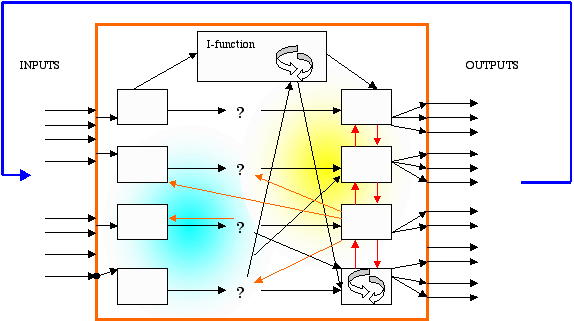
Sleep/wake
24 April
|
... is this pattern of varibility and response to environment a matter of "personality" in the frog? ... Andréa
If the semi-autonomous GCM model is accepted, though, it implies that certain emotions may exist completely independently of any external or otherwise identifiable cause. Is therapy doomed to fail in these cases? Can it still serve a useful purpose? Can these cases always be distinguished from cases with identifiable psychological causes? ... Daniel ... it would make more sense to me to approach the problem/question of personality as the part of the I-function that is a constellation of memory, learning, emotionality and creativity ... Avis I would like to know the exact role of the I-function in dreaming if possible. It could explain where dreams come from and maybe offer additional help in interpreting them ... Matt is it the, functionally speaking, infinite number of neurons we have or the elusive and intangible "I" that can be given the credit for our ability to negotiate our social worlds? ... Caroline So the question is, can we really continue to say that personality is not formed until the child reaches adulthood? ... Elizabeth And how much of our personality resides in our perception of our past, and our relationship with and understanding of the "I" in our every memory? ... Kristine So, what element of emotional free will do we have and how much is regulated by environmental circumstances outside of the I-function's jurisdiction? ... Alice I just think that I-function must be physical and that it is a cop out to say that it is some undefinable. Still, once again I would ask for proof of this. How exactly does the I-function work to evaluate choices? Creativity is something I still definitely can't account for. I used to wonder how my mind was possibly able to construct novel sentences to form a paper..I mean where does that come from? ... There are many creative ideas reached that have not been thought of before by anyone. How can we account for these? ... Nirupama ... if dreams are the work of the I-function, one could suggest that the I-function is equally as capable of "creating" reality as the brain. this is an idea which many would find disturbing as the I-function is meant to represent awareness...it is not supposed to try to fool us. On the other hand, if dreams are not related to the I-function, then one has to wonder where exactly dreams come from ... Sural Can we mold ourselves into the person we want to be? What role do our past experiences play in our personalities today? How does our brain summon them? Through memory only? Memory is an interesting subject but we probably don't have enough class time to discuss it. But how does memory tie in with personality? .... Katrina This weekend I witnessed the effects (side effects?) of a perscription sleeping pill known as Ambien. I'm not quite sure if my friend was asleep, or awake for the few hours I guided them around. Their reality was completely eradicated ... Ingrid A myriad of reactions cannot possibly evade the study of the I-function ... Mel |
Emotions as "generalized control mechanisms"
The I-function a "modeler" of the rest of the nervous system?
Learning and memory (plus)
Tabula rasa model of the nervous system/behavior in social/political context
Reality of the innate
1 May
|
I always thought of it as ME taking a long time to understand the way language works, but to think that it was MY BRAIN that needed the time to work it out not only makes sense, but makes me look at the situation in a whole new light. It's an explanation for the lightbulb that suddenly comes on inside your head. I never considered this to be the case - I don't know why, I just never thought about it. But it does make the brain seem more like a computer or machine than it did before. I don't know - it's definately funny to be sitting here trying to understand understanding. You could probably devote a whole semester just to that .... Jenny
My question is just a slight modification of that: How do we know that we know something? ... It seems like either a memory is there or it isn't -- either the neurons have rearranged or they haven't. Does this imply that there's a further complicating step in memory - the recall of a memory by the I-function? It's not enough simply to have a memory; the I-function must be able to access the memory. ... Daniel In thinking about the effect of experience, we have begun to focus on learing and memory. But what about understanding? Is it an example of experience? How does it differ from learning? ... Meghan The drug effectively manipulates the brain's role in behavior, while the talk therapy does more for allowing the I, or whatever assumes the role of the I, to recognize the need for any treatment ... Caroline However, eventually some seemed to have actual epileptic seizure recordings on the EEG. were they capable of using their i-functions to change the overall neuronal activity pattern of their neocortex? ... Rachel Now I would like to know about the hypothesized organization of these neurons and the evolution of the 'I' ... Mary
|
"Learning" ...
Learning and "understanding" - trying to put it all together ...
3 May
I-function? = neocortex?
Neocortex
|
Trust where you are at any given time Learn Explore Dream Choose
And repeat, over and over and over again | 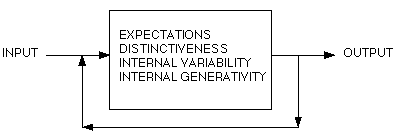
|